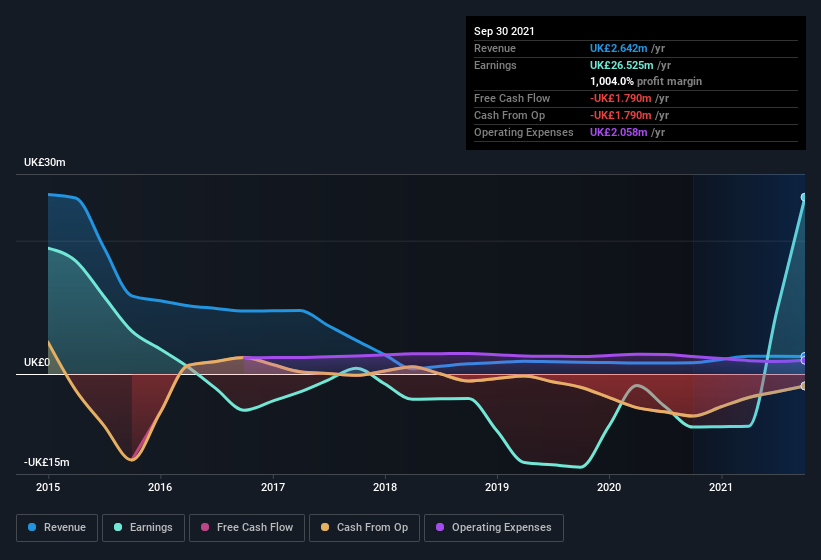- United Kingdom
- /
- Real Estate
- /
- AIM:CIC
Statutory Earnings May Not Be The Best Way To Understand Conygar Investment's (LON:CIC) True Position
Despite posting strong earnings, The Conygar Investment Company PLC's (LON:CIC) stock didn't move much over the last week. We decided to have a deeper look, and we believe that investors might be worried about several concerning factors that we found.
See our latest analysis for Conygar Investment

A Closer Look At Conygar Investment's Earnings
As finance nerds would already know, the accrual ratio from cashflow is a key measure for assessing how well a company's free cash flow (FCF) matches its profit. In plain english, this ratio subtracts FCF from net profit, and divides that number by the company's average operating assets over that period. This ratio tells us how much of a company's profit is not backed by free cashflow.
That means a negative accrual ratio is a good thing, because it shows that the company is bringing in more free cash flow than its profit would suggest. While it's not a problem to have a positive accrual ratio, indicating a certain level of non-cash profits, a high accrual ratio is arguably a bad thing, because it indicates paper profits are not matched by cash flow. That's because some academic studies have suggested that high accruals ratios tend to lead to lower profit or less profit growth.
For the year to September 2021, Conygar Investment had an accrual ratio of 0.36. Statistically speaking, that's a real negative for future earnings. To wit, the company did not generate one whit of free cashflow in that time. In the last twelve months it actually had negative free cash flow, with an outflow of UK£1.8m despite its profit of UK£26.5m, mentioned above. We also note that Conygar Investment's free cash flow was actually negative last year as well, so we could understand if shareholders were bothered by its outflow of UK£1.8m. However, that's not all there is to consider. The accrual ratio is reflecting the impact of unusual items on statutory profit, at least in part. The good news for shareholders is that Conygar Investment's accrual ratio was much better last year, so this year's poor reading might simply be a case of a short term mismatch between profit and FCF. As a result, some shareholders may be looking for stronger cash conversion in the current year.
Note: we always recommend investors check balance sheet strength. Click here to be taken to our balance sheet analysis of Conygar Investment.
How Do Unusual Items Influence Profit?
As it happens, there are a few different things to consider when we look at Conygar Investment's profit and the last one we'll mention is UK£29m gain booked as unusual items. While it's always nice to have higher profit, a large contribution from unusual items sometimes dampens our enthusiasm. We ran the numbers on most publicly listed companies worldwide, and it's very common for unusual items to be once-off in nature. And that's as you'd expect, given these boosts are described as 'unusual'. Conygar Investment had a rather significant contribution from unusual items relative to its profit to September 2021. As a result, we can surmise that the unusual items are making its statutory profit significantly stronger than it would otherwise be.
Our Take On Conygar Investment's Profit Performance
Conygar Investment had a weak accrual ratio, but its profit did receive a boost from unusual items. Considering all this we'd argue Conygar Investment's profits probably give an overly generous impression of its sustainable level of profitability. If you'd like to know more about Conygar Investment as a business, it's important to be aware of any risks it's facing. Be aware that Conygar Investment is showing 2 warning signs in our investment analysis and 1 of those is a bit unpleasant...
In this article we've looked at a number of factors that can impair the utility of profit numbers, and we've come away cautious. But there is always more to discover if you are capable of focussing your mind on minutiae. For example, many people consider a high return on equity as an indication of favorable business economics, while others like to 'follow the money' and search out stocks that insiders are buying. While it might take a little research on your behalf, you may find this free collection of companies boasting high return on equity, or this list of stocks that insiders are buying to be useful.
New: AI Stock Screener & Alerts
Our new AI Stock Screener scans the market every day to uncover opportunities.
• Dividend Powerhouses (3%+ Yield)
• Undervalued Small Caps with Insider Buying
• High growth Tech and AI Companies
Or build your own from over 50 metrics.
Have feedback on this article? Concerned about the content? Get in touch with us directly. Alternatively, email editorial-team (at) simplywallst.com.
This article by Simply Wall St is general in nature. We provide commentary based on historical data and analyst forecasts only using an unbiased methodology and our articles are not intended to be financial advice. It does not constitute a recommendation to buy or sell any stock, and does not take account of your objectives, or your financial situation. We aim to bring you long-term focused analysis driven by fundamental data. Note that our analysis may not factor in the latest price-sensitive company announcements or qualitative material. Simply Wall St has no position in any stocks mentioned.
About AIM:CIC
Conygar Investment
The Conygar Investment Company PLC ("Conygar") is an AIM quoted property investment and development group dealing in UK property.
Mediocre balance sheet with low risk.
Market Insights
Community Narratives



